Cecilia Vicuña
Cecilia Vicuña
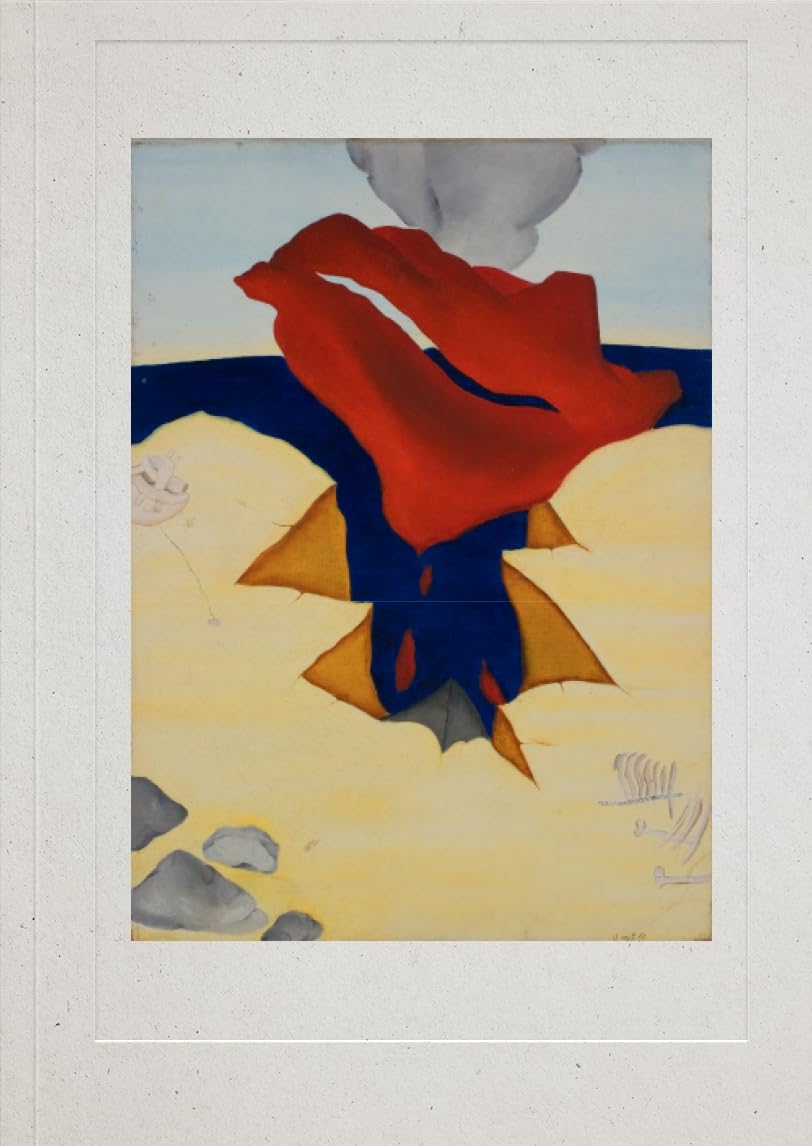
Dreaming Water
Dreaming Water is the most thorough monograph dedicated to the work of Chilean artist Cecilia Vicuña to date. Vicuña coined the term “Arte Precario” in the mid-1960s as a new category for her works composed of debris and structures that disappear in the landscape, and which also include her quipus (“knot” in Quechua), envisioned as poems in space.
Dreaming Water brings together over 200 works—including paintings, drawings, screenprints, collages, textiles, videos, photographs, installations, poetry, artist books and performances—created throughout the artist’s remarkable career. It also features several stimulating texts—a lengthy epistolary piece by curator and editor Miguel A. López as well as new essays by anthropologist Elizabeth A. Povinelli, curator Catherine de Zegher and art historian José de Nordenflycht. Vicuña herself contributes two texts, reflecting on her drawings from the “Palabrarmas” project and the activism of the group Artists for Democracy, which she cofounded in 1974. A rousing conversation between Vicuña, anthropologist Marisol de la Cadena and curator Camila Marambio also figures in the book, blending the artist’s voice with those who are experts in fields pertinent to her practice.

Deer Book/Libro Venado
Inspired initially by Jerome Rothenberg’s translation Flower World Variations, which Cecilia Vicuña first encountered in 1985, Deer Book brings together nearly forty years of the artist’s poetry, “poethical” translations, and drawings related to cosmologies and mythologies surrounding the deer, and sacrificial dance in cultures around the world.
Woven like one of her quipu installations, Vicuña’s texts—which include original compositions in Spanish as well as English translations by Daniel Borzutzky—become meditations on translation, not just of the sacred nature of this animal but on how our understandings of ceremony and ritual are transformed, by this ongoing process. Taken as inspiration rather than conundrum, the impossibility of translation opens up poetic possibilities for Vicuña as she continues her lifelong exploration into the nature of communication across eras and distant lands, languages and shared symbols within Indigenous spiritualities.

Saborami: Expanded facsimile edition
Cecilia Vicuña created Saborami in the aftermath of the September 1973 military coup in Chile. Combining poetry, journal entries, documentation of artworks including assemblages and paintings, the book was published in Devon, England in an edition of 250 hand-made copies by the artist-led Beau Geste Press. It was one of the first artistic responses to the violence of the fascist junta.
In recent years, Vicuña has gained increasing renown, including a retrospective at Kunstinstituut Melly (FKA Witte de With, 2019) and installations at the Guggenheim (2022); and Tate Modern (2023). Saborami is one of her most important works, made at a turning point in her life and career, and reverberating through to the present day. Though the book is highly regarded, it has also been hard to access. This new, expanded facsimile edition remedies this oversight, and restates Saborami as a central example of artistic engagement in material and revolutionary resistance.
Engaging obliquely with the legacies of surrealism, contemporaneous experiments in concrete poetry and the British conceptual art practices of the 1960s and 1970s, Saborami is part of an exilic and internationalist tradition. Years ahead of her time, Vicuña outlines an eco-socialist and feminist vision in the face of defeat.
Coinciding with the fiftieth anniversary of the book’s original publication and of the coup in Chile, this expanded edition contains a new introduction by art historian and curator Amy Tobin and poet and writer Luke Roberts. It includes rarely seen archival material from Vicuña’s time in London, such as contributions to the feminist newspaper Spare Rib, commentary from BBC coverage, and her role in Artists for Democracy in Chile and other solidarity campaigns.

CCA Wattis Institute for Contemporary Arts
Cecilia Vicuña: Word Weapons
This book brings together the Palabrarmas series by the artist, poet, and activist Cecilia Vicuña (b. 1948, Santiago, Chile). A neologism that translates to “word weapons” or “word arms,” Palabrarmas imagine new ways of seeing language. By taking the form of collages, silkscreens, drawings, poems, fabric banners, cut-outs, mixed media installations, and street actions, Vicuña brings together many aspects of her practice in poetry, activism, and visual art, allowing new meanings to emerge. This book presents a range of palabrarmas, created over the past four decades, in color for the first time.
Cecilia Vicuña is an artist, poet and activist currently based between New York and Santiago.

Spit Temple
The first overview of the work of this seminal multi-disciplinary artist, Spit Temple collects texts and transcriptions of Vicuna's uncategorizable improvised performances, which combine singing, movement, chants, and stories. Also included are a critical introduction by Rosa Alcala, a poetic memoir by Vicuna (translated by Alcala) addressing her life in performance, and a series of response pieces from contemporary writers including Juliana Spahr, Rodrigo Toscano, and Maria Damon.
Cecilia Vicuña is a Chilean poet, artist and filmmaker. The author of twenty poetry books published in Europe, Latin America and the U.S., she performs and exhibits her work widely. A precursor of conceptual, impermanent art and the improvisatory oral performance, her work deals with the interactions between language, earth and textiles. Her recent books are SPIT TEMPLE: THE SELECTED PERFORMANCES OF CECILIA VICUÑA (Ugly Duckling Presse, 2012), Chanccani Quipu, a new artist book forthcoming by Granary Books, and SABORAMI (ChainLinks, 2011). She co-edited The Oxford Book of Latin American Poetry (2009). Since 1980 she divides her time between Chile and New York.

Saborami
First published in 1973, two months after the military coup in Chile, Cecilia Vicuña's SABORAMI is a document of the times and the way in which history can change art. It is filled with the urgent hope that art, too, can change history. Put together when Vicuña was just twenty-five years old, the poems, paintings, and objects of SABORAMI enact a complex and multidimensional conversation. The meanings of the works (which were created over a seven year period) shifted radically after the events of September 11, 1973. Their meanings continue to shift and resonate in light of political events today. This recreation of the original SABORAMI is published with a new afterword Vicuña wrote especially for this edition.
Cecilia Vicuña is a poet, visual artist, and filmmaker born in Santiago de Chile. The author of twenty books of poetry, she exhibits and performs widely in Europe, Latin America, and the United States. Her multidimensional works begin as a poem, an image or a line that morphs into a film, a song, a sculpture or a collective performance.
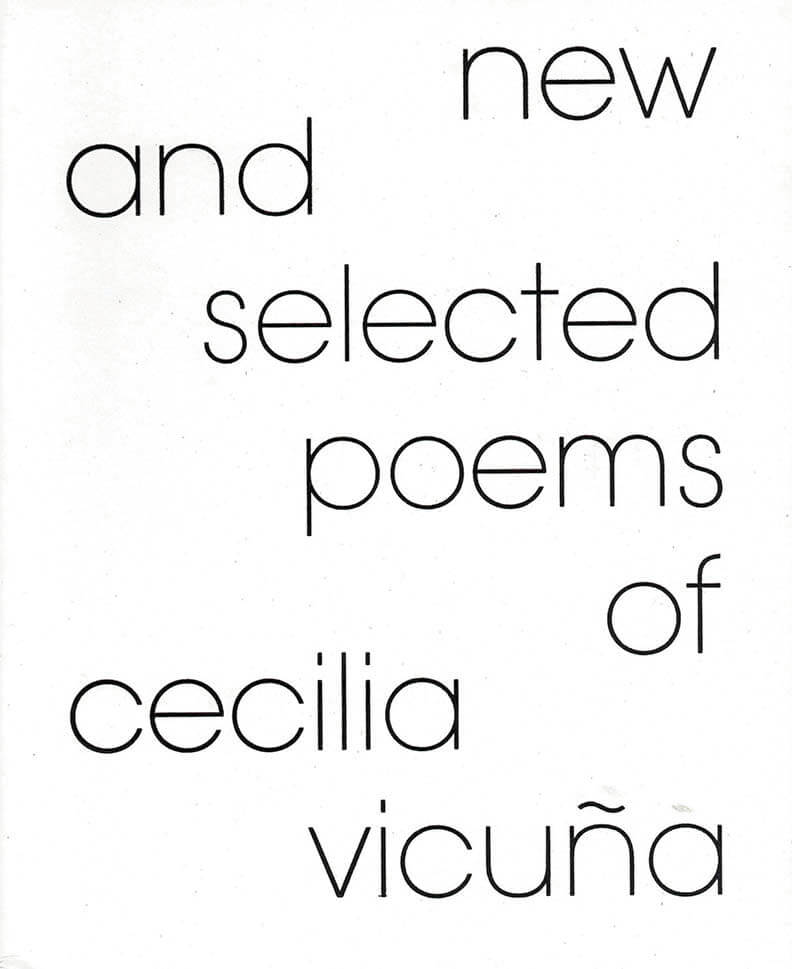
New and Selected Poems of Cecilia Vicuña
New and Selected Poems of Cecilia Vicuña is a telling of old cultures, modern nation states and lives in exile. Rodrigo Toscano calls Vicuña's poetry the outer out, beyond nation states, passed 'inter state' affairs, in other words, close in, as close as we get to our fair planet's sources, and to each other. In this bilingual collection, Vicuña and her translator, Rosa Alcalá, are artist witnesses to a natural world that is a storehouse of sacred words, seeds, threads and songs. Present everywhere, they are sources for a rebalancing in human relationships and for new forms of grace and healing. In Vicuña's vision, art is life and intimacy with it is transformative.
Cecilia Vicuña is a Chilean poet, artist and filmmaker. The author of twenty poetry books published in Europe, Latin America and the U.S., she performs and exhibits her work widely. A precursor of conceptual, impermanent art and the improvisatory oral performance, her work deals with the interactions between language, earth and textiles. Her recent books are NEW AND SELECTED POEMS OF CECILIA VICUÑA (Kelsey Street Press, 2018), SPIT TEMPLE: THE SELECTED PERFORMANCES OF CECILIA VICUÑA (Ugly Duckling Presse, 2012), Chanccani Quipu, a new artist book by Granary Books, and SABORAMI (ChainLinks, 2011). She co-edited The Oxford Book of Latin American Poetry (2009). Since 1980 she divides her time between Chile and New York.
And more

A Grammar Built with Rocks
Shoghig Halajian, Suzy Halajian
Featuring writing and artistic practices that trace the racialized and gendered relationship between bodies and land, A Grammar Built with Rocks explores artists’ engagement with sites of physical dispossession and socio-ecological crisis, highlighting how creative research methodologies can serve as radically new place-making practices. The publication brings together a range of feminist-decolonial texts and visual contributions that explore how movement, transience, and improvisation offer alternative ways of being-together while being-in-place.
Contributions by: Basel Abbas and Ruanne Abou-Rahme with Fawz Kabra, Jheanelle Brown and Julien Creuzet, Carolina Caycedo, Ryan C. Clarke and Cauleen Smith, DAAR—Decolonizing Architecture Art Research with Nicola Perugini, Sandra de la Loza, Demian DinéYazhi’, rafa esparza, Mashinka Firunts Hakopian, Tia-Simone Gardner, Raquel Gutiérrez, Suzanne Kite with Mahpíy̌a Nážinn, Candice Lin, Jumana Manna, K-Sue Park, Christine Rebet, Susan Silton, and Asiya Wadud.
The book also includes a reader, with grounding texts, sources of inspiration, and research references, by Jason Allen-Paisant, Dionne Brand, Suzanne Césaire, Lisa Lowe, Camila Marambio and Cecilia Vicuña, Robyn Maynard and Leanne Betasamosake Simpson, M. NourbeSe Philip, and K. Wayne Yang.
About the editors
Shoghig Halajian is a curator, writer, and artist whose work explores queer and diasporic imaginaries, place-based practices, and experiments in collectivity and collaboration. She is co-editor of the online journal, Georgia, which is supported by a Creative Capital | Andy Warhol Foundation Arts Writers Grant. Select curatorial projects include: A grammar built with rocks (Human Resources LA, One Archives at the USC Libraries, and REDCAT, 2018); At night the states (Hammer Museum, 2017); DISSENT: what they fear is the light (LACE, 2016); and rafa esparza: I have never been here before (LACE, 2015). She was a TBA21 Ocean Space Fellow in Venice (2021) and a curatorial fellow at École du Magasin in Grenoble (2011), where she co-curated the exhibition, The Whole World is Watching, on the the collective Vidéogazette (1973–76), which organized a public access television program in the city. She received her PhD in Art History, Theory, and Criticism with a specialization in Critical Gender Studies from the University of California, San Diego in 2024.
Suzy Halajian is a curator and writer based in Los Angeles, where she serves as the Executive Director and Curator at JOAN. Her practice is invested in long-term collaborations with artists, critically engaging with the intersections of art, politics, and social histories. She explores strategies of image-making through the lens of colonial histories and contemporary surveillance states. Halajian has curated exhibitions and public programs at institutions such as Los Angeles Contemporary Exhibitions (LACE), ONE Archives at the USC Libraries, the Hammer Museum, and Human Resources Los Angeles, as well as Tanya Bonakdar Gallery (New York), Oregon Contemporary (Portland), Kunstverein (Amsterdam), UKS (Oslo), Galerie Hubert Winter (Vienna), and the Sursock Museum (Beirut). She also serves on the Programming Committee at Human Resources and has worked with nonprofit organizations including the MAK Center for Art and Architecture (Los Angeles) and Ashkal Alwan (Beirut). Her curatorial work and writing have been supported by the Graham Foundation, the Andy Warhol Foundation Arts Writers Grant—for Georgia, a journal she co-founded and co-edits with Anthony Carfello and Shoghig Halajian—and a Curatorial Research Fellowship from the Andy Warhol Foundation for the Visual Arts. Halajian’s writing has appeared in ArteEast, BOMB, X-TRA, Ibraaz, and other publications. She holds an MA from the Center for Curatorial Studies at Bard College and is currently a PhD candidate in the Film and Digital Media program at the University of California, Santa Cruz.
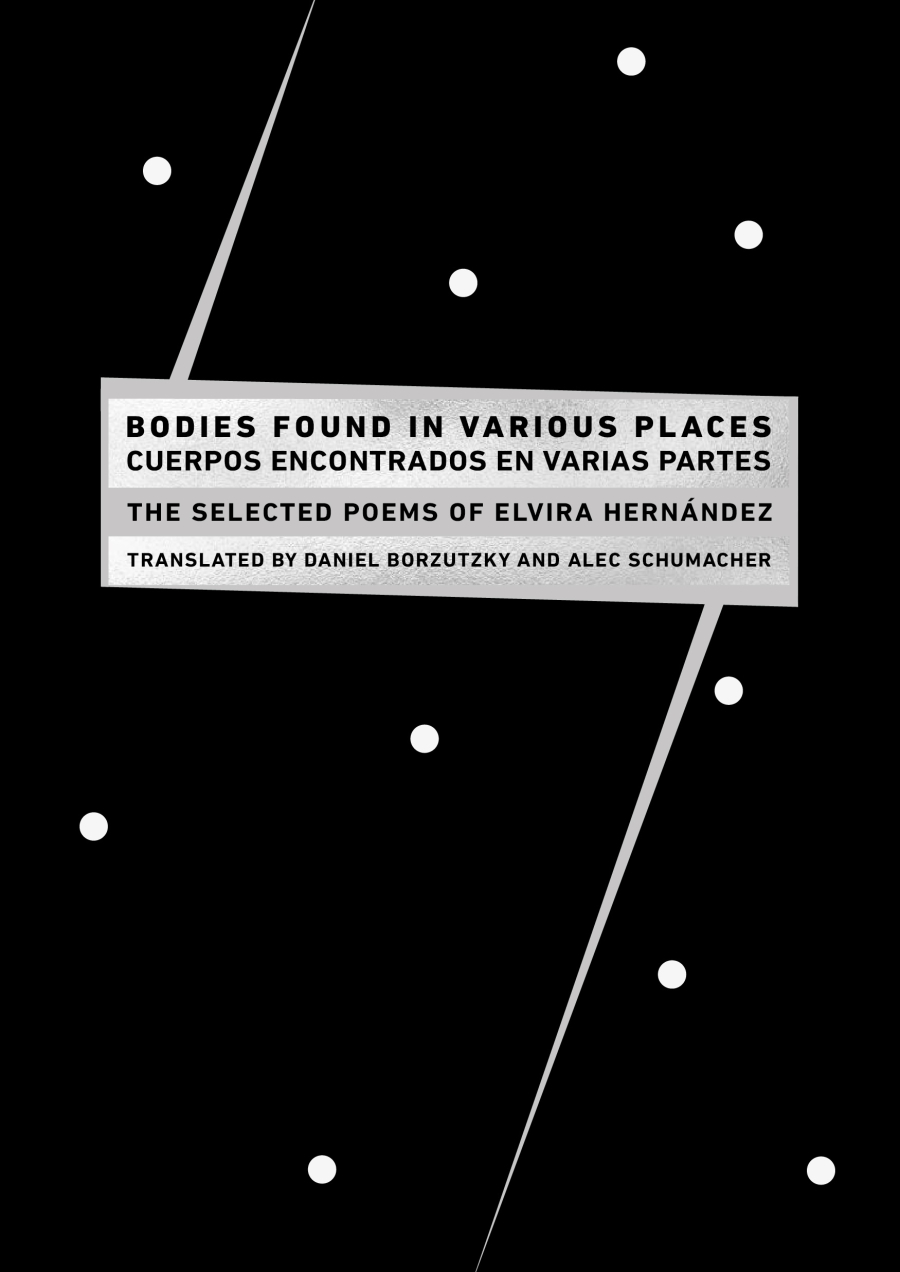
Bodies Found in Various Places
Elvira Hernández, Daniel Borzutzky and 1 more
The first anthology of Elvira Hernández’s poetry translated into English brings the award-winning contemporary Chilean poet's work of love, survival, persistence, disturbance, amazement, and delight to a new audience.
Elvira Hernández has occupied a marginal position in the Chilean poetic scene for decades, her quiet but mordant voice looking inward and outward, ironizing the circumstances of life that have brought us to this critical point in society. As recently as 2018, her work has become more visible after receiving the Jorge Teillier National Poetry Award (2018), the Pablo Neruda Ibero-American Poetry Award (2018), and the National Literature Prize (Chile 2024). With this belated recognition of her work has come an interest in studying her unique poetic language, with new critical books forthcoming from Spanish and Latin American publishers. Bodies Found in Various Places collects poems written from 1981-2016, providing readers with a curation of texts that show why Hernández is one of the most vital Latin American poets writing today.
"Elvira Hernández wrote her poem “The Chilean Flag” after she herself had been detained and tortured by the dictatorship for not complying with its lies. While Chileans were trained to look the other way, to go quiet by this terror, Elvira Hernández wrote a poem that could not be printed. Yet, the poem escaped like a prisoner and began circulating in Xeroxes, from hand to hand, until ten years later it was finally printed in Buenos Aires. In Elvira Hernández’s poetry, each line restores the right of words to speak. Each word becomes a healer, a prayer for a wounded, enslaved humanity forced to obey the rule of profit over life."— Cecilia Vicuña, author of Spit Temple
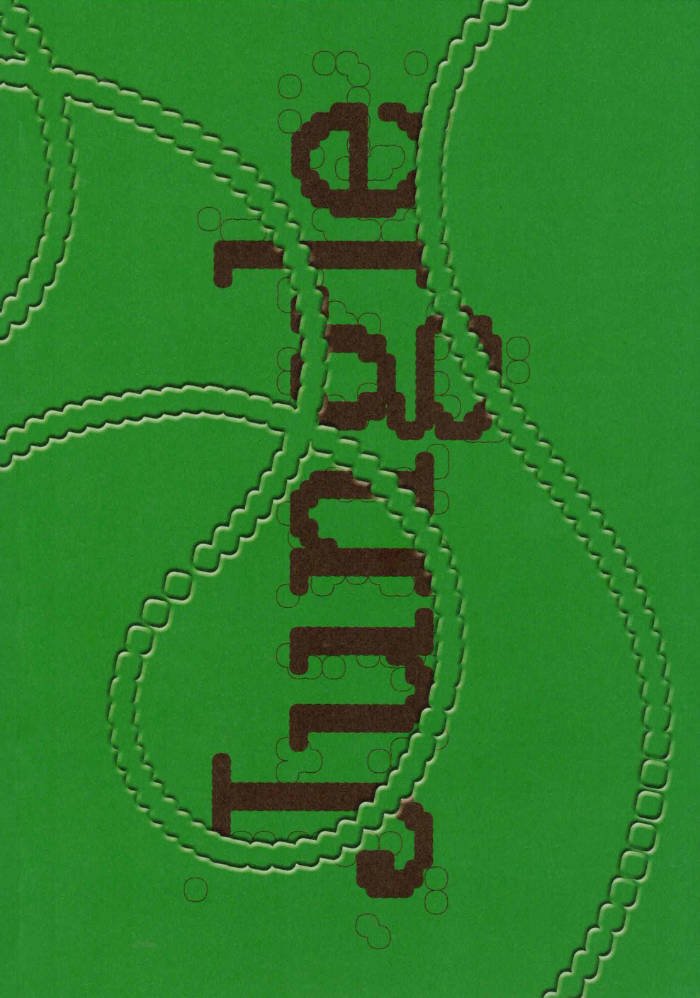
Jungle
Jungle, (the latest 2025 self-published zine offering from studio saudari), delves into The Socio-Political, The Pitfalls of Neoliberalism, Circus State, Environmental Collapse, Heterotopias & Growth ~ Decay.
Referencing Upton Sinclair’s novel The Jungle (1905), this print issue aims to combine various interpretations of The Jungle as a site of critique, of contention, of potential growth.
Contributors:
y3000w, Video Club, Fred Horton, Jordan Ossermann, Tristac Gac, Tom Hegen, Santiago Barragán, Anu Jakobson, Camille Theodet, George Nebieridze, Mu Pan, Robert Zhao Renhui, Thérèse Rafter, Cecilia Vicuña, Dani Santander Villarroel, Adam Call Roberts, Dr. Sönke Johnsen, Elena Zaghis, Miguel Garchitorena, Amanda Nell Eu, Mishka Mahomed, Dani Kyengo O'Neill / BŪJIN, Erin Jane Nelson, Mariana E. Rivas Salazar, Kim Rosario, Rachel Lamot, Marion Post Wolcott, Madina Mahomedova.
Designed by Felicia Usinto & Sera van de Water
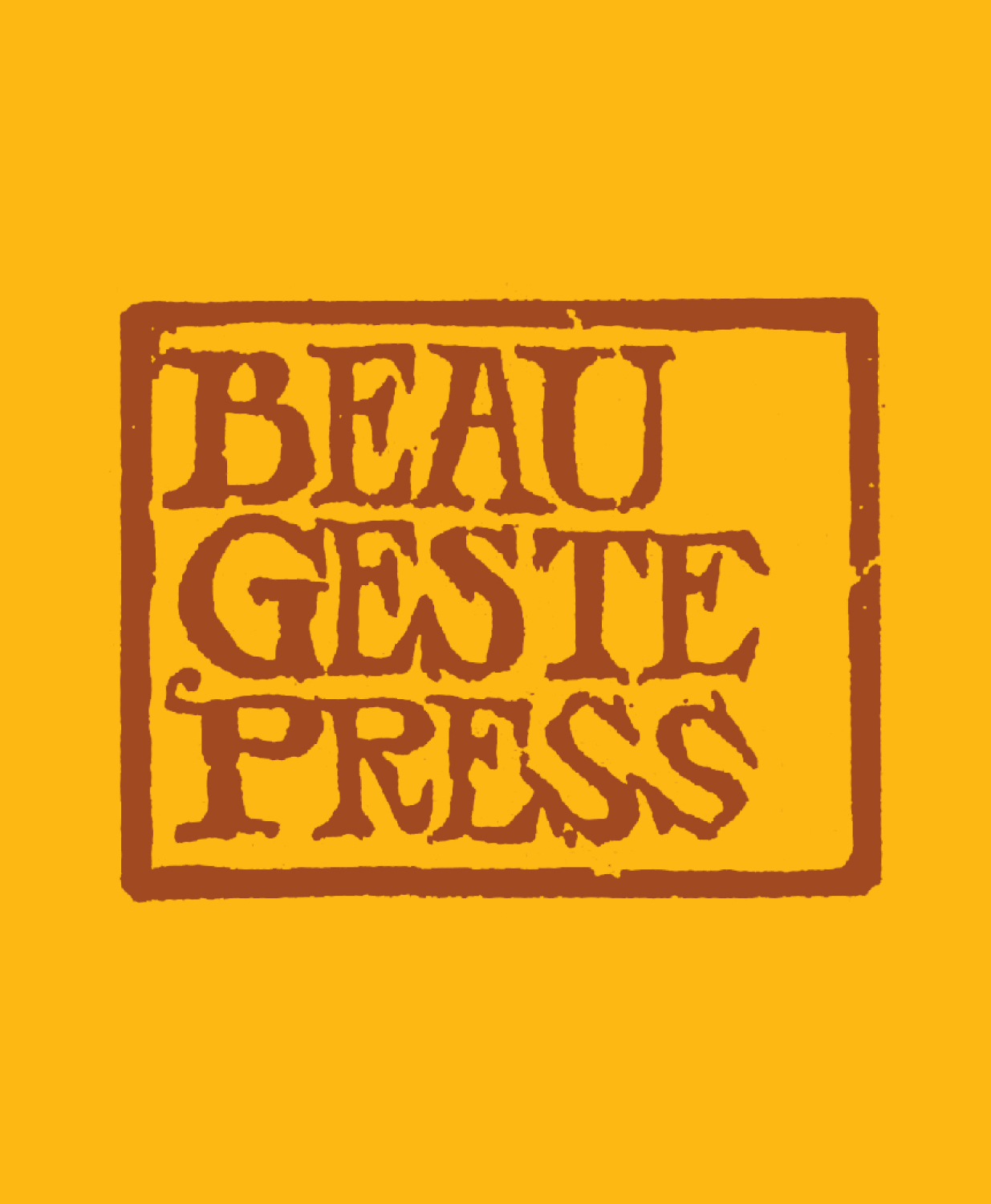
Beau Geste Press
The “catalogue dé-raisonné” of all the printed matter produced by the independent publishing house Beau Geste Press, that federated visual poets, neo-Dadaists and international artists affiliated with the Fluxus movement from 1971 to 1976.
The independent publishing house Beau Geste Press (BGP) was founded in 1971 by the Mexican artists' couple Martha Hellion and Felipe Ehrenberg. Together with their two children, they moved into a farmhouse in Devon, in the English countryside, where, joined by a group of friends including the artist and art historian David Mayor, the graphic designer Chris Welch and his partner Madeleine Gallard, they formed 'a community of duplicators, printers, and artisans'.
Beau Geste Press was active until 1976, printing publications by visual poets, neo-Dadaists and international artists affiliated with the Fluxus movement. Specialising in limited-edition artists' books, it published the work of its own members, but also that of many of their colleagues worldwide. In the spirit of cottage industry, Beau Geste Press adapted its methods and scale of production to its needs, keeping all stages, from design and printing to distribution, under the same—bucolic—roof.
Although it operated from the periphery of the main artistic centres of its time, Beau Geste Press was undoubtedly one of the most productive and influential publishing ventures of its generation.
Published by the CAPC musée d'art contemporain de Bordeaux in collaboration with Bom Dia Boa Tarde Boa Noite, this reference book surveys the history of the independent publishing house Beau Geste Press (BGP) through the publications of its founding members Felipe Ehrenberg, Martha Hellion, David Mayor and Chris Welch, and of the numerous visitors to its rural outpost from 1971 to 1976. A “catalogue dé-raisonné” of all the printed matter produced by BGP, it is complemented by critical essays and first-hand texts that explore the working methods (economy and autonomy of production, distribution of books via post) and document the international influence of this short-lived “community of duplicators, printers, and artisans”.
Essays by Karen Di Franco, Zanna Gilbert, Polly Gregson, Carmen Juliá, Alice Motard, Mila Waldeck ; original texts by Allen Fisher, Mike Leggett, Clive Phillpot, Cecilia Vicuña.
Editions by Claudio Bertoni, Ulises Carrión, Helen Chadwick, GJ de Rook, Felipe Ehrenberg, Matthias Ehrenberg, Yaël Ehrenberg, Allen Fisher, Ken Friedman, Mick Gibbs, Klaus Groh, Kristján Guðmundsson, Mary Harding, Woody Haut, Jan Hendrix, Jarosław Kozłowski, Myra Landau, Michael Leggett, Rafael López, Raúl Marroquin, Pepe Maya, David Mayor, Anthony McCall, Victor Musgrave, Opal L. Nations, Colin Naylor, Michael Nyman, Ryo & Hiroko Koike, Takako Saito, Carolee Schneemann, Sitting Dog & Co, Endre Tót, Yukio Tsuchiya, Ben Vautier, Cecilia Vicuña, Chris Welch, Hideki Yoshida...
Each book is accompanied by five unprecedented bookmarks.
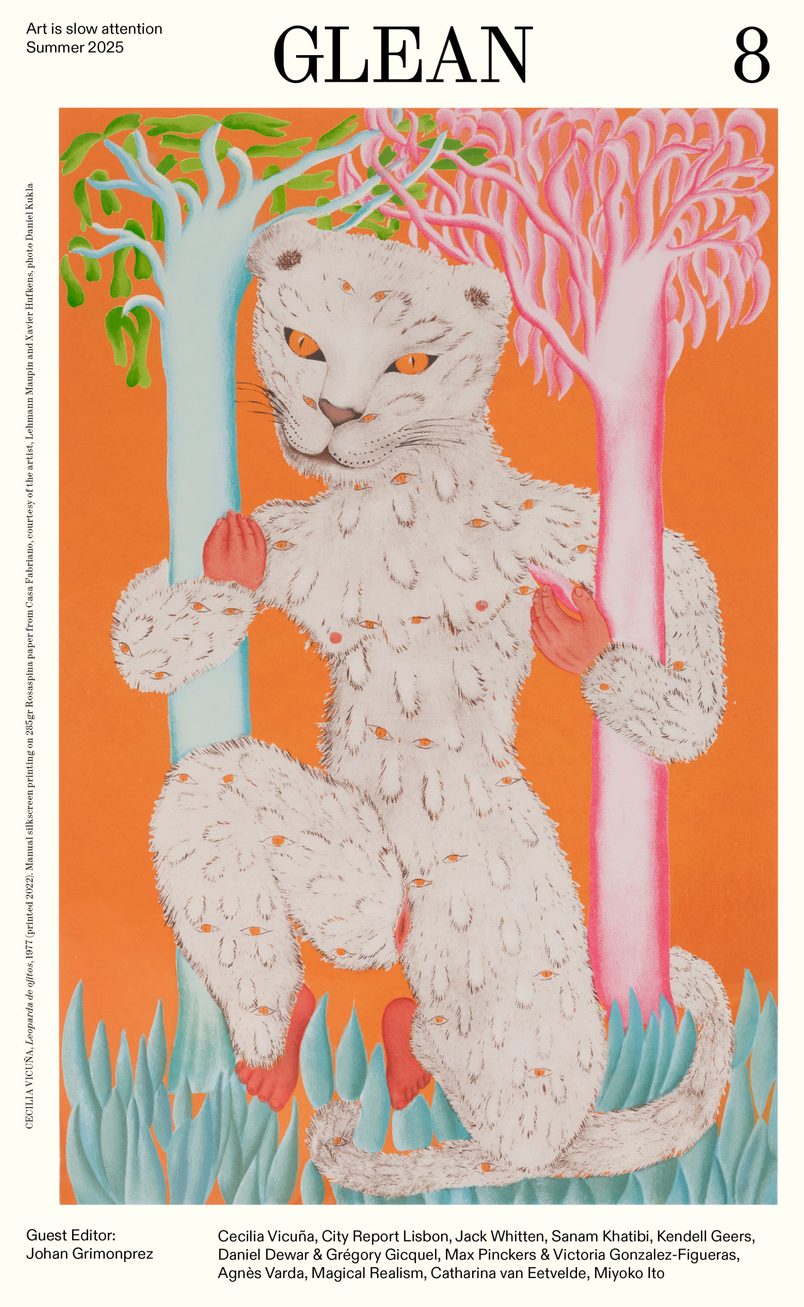
GLEAN 8 - Summer 2025
Contributions by: Cecilia Vicuña, City Report Lisbon, Jack Whitten, Sanam Khatibi, Kendell Geers, Daniel Dewar & Grégory Gicquel, Max Pinckers & Victoria Gonzalez-Figueras, Agnès Varda, Magical Realism, Catharina van Eetvelde, Miyoko Ito.
GLEAN is a Brussels-based magazine for contemporary art with quarterly publications in both English and Dutch.

Essays
Poetry as both a form and genre has many possibilities to exist within; however, poetry too often is burdened by the imperative to have an argument and a set of imagery and meanings that are preconceived and placed within the poem. In this way, poetry gets conflated with writing a thesis or project, and the poet simply the presenter of perfectly argued language. When poets attempt to bridge the gap between genres and write within the contemporary essay form, they are tasked to construct perfect arguments there as well and avoid the associative and aesthetic logic that makes poems important. The term essay itself was coined by Michel de Montaigne in the 1500s — it comes from the French word essai, which means to test or experiment with what one knows as a learning tool, and is in partial opposition to the terms we use to discuss the essay now
ESSAYS calls on thinkers and writers to move beyond this linear thinking into the realm of what an essay by someone like Montaigne might do. His essays do as they say they will—they test out ideas, they are unafraid to get messy in their execution, they are brave enough to go forward into the uncharted waters. In them, it’s completely beside the point to get back to where they started, let alone where they’d say they would go. They are simply beside the point. It’s true.
ESSAYS, edited by Dorothea Lasky, is a book of essays on the essay, which enact and query these directives. The volume collects essays by poets Ariel Goldberg, Ken Chen, Wayne Koestenbaum, Tracie Morris, Anaïs Duplan, Raquel Salas Rivera, Brandon Shimoda, Cecilia Vicuña, Fred Moten, and Mónica de la Torre.

What happens between the knots?
Anthony Huberman, Jeanne Gerrity
The third volume of the Wattis Institute's annual reader is informed by themes found in the work of Cecilia Vicuña, including ecofeminism, indigenous forms of knowledge, poetry and politics, dissolution and extinction, exile, dematerialization, regeneration, and environmental responsibility.
The Wattis Institute's annual reader, A Series of Open Questions, provides an edited selection of perspectives, images, and references related to the Wattis's year-long "On our mind" research seasons. Each volume includes newly commissioned writing by members of the research season's core reading group, as well as text and visual contributions by a diverse range of other artists and writers. The title of each reader takes the form of a question and becomes, as new books are published, a gradually evolving series of open questions.
Contributions by Gloria Anzaldua, Elvira Espejo Ajca, Erika Balsom, María Berrios, Marisol de la Cadena, Lynne Cooke, Miho Dohi, Ricki Dwyer, Silvia Federici, Tonya Foster, Phillip Greenlief, Sheroanawe Hakihiiwe, Brian Karl, Dionne Lee, Zoe Leonard, Rosemary Mayer, Koyoltzintli Miranda-Rivadeneira, Denise Newman, Thao Nguyen Phan, Frances Richard, Dylan Robinson, Abel Rodriguez, Oscar Santillan, Alessandra Troncone, Anna Lowenhaupt Tsing, Ignacio Valero, Cathrine Veikos, Cecilia Vicuña, Diego Villalobos, Jacopo Crivelli Visconti, Carla Zaccagnini.

I'll Drown My Book: Conceptual Writing by Women
Vanessa Place, Teresa Carmody and 2 more
Conceptual writing is emerging as a vital 21st century literary movement and I’ll Drown My Book represents the contributions of women in this defining moment. Edited by Caroline Bergvall, Laynie Browne, Teresa Carmody and Vanessa Place, I’ll Drown My Book takes its name from a poem by Bernadette Mayer, appropriating Shakespeare. The book includes work by 64 women from 10 countries, with contributors’ responses to the question—What is conceptual writing?—appearing alongside their work. I’ll Drown My Book offers feminist perspectives within this literary phenomenon.
CONTRIBUTORS:
Kathy Acker, Oana Avasilichioaei & Erin Moure, Dodie Bellamy, Lee Ann Brown, Angela Carr, Monica de la Torre, Danielle Dutton, Renee Gladman, Jen Hofer, Bernadette Mayer, Sharon Mesmer, Laura Mullen, Harryette Mullen, Deborah Richards, Juliana Spahr, Cecilia Vicuña, Wendy Walker, Jen Bervin, Inger Christiansen, Marcella Durand, Katie Degentesh, Nada Gordon, Jennifer Karmin, Mette Moestrup, Yedda Morrison, Anne Portugal, Joan Retallack, Cia Rinne, Giovanni Singleton, Anne Tardos, Hannah Weiner, Christine Wertheim, Norma Cole, Debra Di Blasi, Stacy Doris & Lisa Robertson, Sarah Dowling, Bhanu Kapil, Rachel Levitsky, Laura Moriarty, Redell Olsen, Chus Pato, Julie Patton, Kristin Prevallet, a.rawlings, Ryoko Seikiguchi, Susan M. Schultz, Rosmarie Waldrop, Renee Angle, Rachel Blau DuPlessis, Theresa Hak Kyung Cha, Tina Darragh, Judith Goldman, Susan Howe, Maryrose Larkin, Tracie Morris, Sawako Nakayasu, M. NourbeSe Philip, Jena Osman, kathryn l. pringle, Frances Richard, Kim Rosenfeld, and Rachel Zolf.